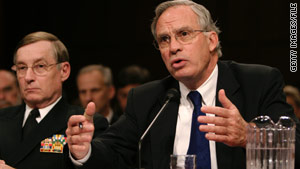Destruction of CIA tapes sparked concerns

- Then-CIA chief Porter Goss agreed with destruction of tapes after the fact, documents say
- Goss didn't authorize destruction or think it was a "wise" move, ex-U.S. intelligence official says
- Nearly 100 videotapes showing the harsh interrogation of two al Qaeda detainees destroyed
- Then-White House counsel "livid" about not being notified in advance, documents say
(CNN) -- The destruction of nearly 100 videotapes showing the harsh interrogation of two al Qaeda detainees in 2005 triggered concerns within the CIA over whether it was adequately cleared, according to newly released documents.
Top White House counsel also was livid about not being informed about the move in advance, the documents show.
The documents -- with large sections blacked out -- were released Thursday in response to a Freedom of Information Act request by the American Civil Liberties Union.
Internal e-mails include one alleging that Porter Goss, then CIA chief, agreed with the decision after the fact.
"PG laughed and said that actually, it would be he, PG, who would take the heat," one e-mail reads. "PG, however, agreed with the decision."
A former U.S. intelligence official familiar with the circumstances surrounding the tapes said Goss did not authorize the destruction and did not believe it was "right" or a "wise" move.
Goss believed the tapes "provided proof that the CIA has followed Justice Department guidelines" on interrogations, the official said.
But the official added that Goss did "understand and sympathize with Jose Rodriguez's motives" for destroying the tapes. Rodriguez, head of the CIA's clandestine service, was concerned the tapes could become public.
"As Jose said, the heat from destoying [sic] is nothing compared to what it would be if the tapes ever got into public domain -- he said that out of context, they would make us look terrible; it would be 'devastating' to us," the e-mail reads.
It is not clear who wrote this e-mail, which was sent to Kyle "Dusty" Foggo, then the CIA's executive director.
One e-mail to Foggo says John Rizzo, then acting general counsel at the CIA, had to inform White House counsel Harriet Miers "because it was she who had asked to be advised before any action was taken. Apparently, Rizzo called Harriet this afternoon and she was livid, which he said was actually unusual for her."
The person writing the e-mail indicates to Foggo that while he understood the decision, he was "no longer feeling comfortable" with it and that "we may have 'improperly' destroyed something."
